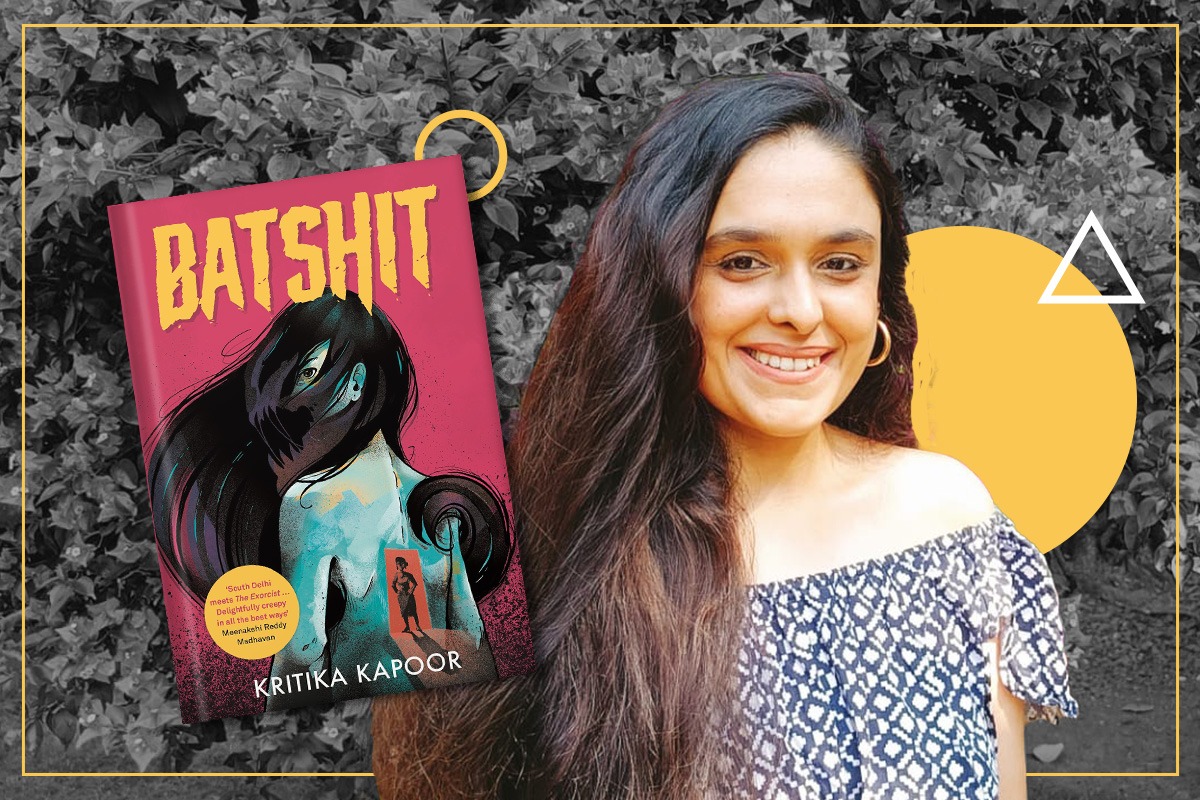
Kritika Kapoor’s deliciously feminist debut novel Batshit unwraps repressed anger in women with unrealistic beauty standards and other regulations that society throw on them but with a haunting twist! By Khushi Arora
Kritika Kapoor has an eye for social paradoxes, especially in the case of womanhood. With her debut fiction, she strives to explore what lies beneath our theories of feminism and the trauma trickled-down by mothers with the help of blood and gore. The terror of Batshit will leave you to wonder about the subconscious adherence of a woman to the society — the chains of a supposedly free woman. Read on as Kunzum’s Khushi Arora explores the appeal of the horror through a feminist lens with the author Kritika Kapoor.
A Conversation with Kritika Kapoor
Kunzum: Meenakshi Reddy describes Batshit as ‘South Delhi meets The Exorcist.’ Despite living in Pune, what is it about Delhi that made you choose it as the setting for your book?
Kritika Kapoor: I grew up in Delhi and spent my most formative years [there] — school, teens, college. The very beginning of my career as a journalist was here. Batshit is inspired by those years. I specifically chose South Delhi for the very peculiar form of benign and almost seductive patriarchy I observed here growing up. It wasn’t necessarily about subjugating women in kitchens or keeping them from being educated or having careers, but it was more insidious — whittling down women’s lives till all that mattered was their appearance, their marital status, whether they were good girls, daughters, wives, mothers and so forth. And they sold it to you like it was your happily ever after — like what’s wrong with the ‘trophy wife’ existence? Why would you not want this life of luxury and lobotomy?
It also had the most bizarre impact on women, who couldn’t fight that sexism and claustrophobia, because it didn’t necessarily always present itself as aggressive or malevolent. I mean, I studied in LSR, where we were all so theoretically and aggressively feminist in the classroom, but practically, outside that classroom, many of us still struggled to be feminist when trying to ignore ridiculous body and beauty standards. A lot of us were still fainting because we were on juice cleanses and zero carb diets. A lot of us succumbed to the pressure to get arrange married or have babies because our ‘biological clocks were ticking’. I wanted to capture this internal struggle in Batshit.
Kunzum: Are there any myths or stereotypes associated with the horror genre you’ve tried to bust through Batshit?
Kritika Kapoor: I was so conscious about not wanting to fall for any stereotype or trope, that I deliberately tried not to write Batshit as a ‘horror novel’. I wanted it to be scary, and I wanted to make Pia’s possession spine-chilling at various points but I did not want her head spinning 360 degrees while she threw up (The Exorcist has already done that very well and the rest have copied it to death). Neither did I want a tantric beating her with a jhadoo, saying ‘chudail nikal jaa!’.
I think the biggest misconception about horror is that it needs to be a loud production of these elements, when in fact, our biggest fears our best played upon subtly — that barely perceptible shift in one’s everyday reality, where suddenly you feel like ‘something is not quite right.’ Or a figure looming in the shadows. With Batshit, I played around more with the psychological aspect of all our inner demons. I also didn’t want any mindless scares or gore because if a book I’m reading doesn’t have a proper backstory to its ghost or zombies, I immediately get desensitised to the whole thing.
Kunzum: Horror media can often reflect some of the deepest fears and anxieties we share as a society. And Pia Bhandari’s circumstances hit really close to home. Can you tell our readers about some of the social elements in the book? (Spoiler free, of course!)
Kritika Kapoor: With Batshit, I primarily wanted to focus on the repressed anger and resentment in women over being forced to constantly be this idealized version of a woman. Fitting into that box often comes at a great personal cost — sacrificed dreams, constant compromises, and violence that’s always channeled inwards, where it’s passed on as the ‘Mother Wound’ from mums to daughters or takes the form of eating disorders. And once women are forced to become these zombies, they’re then mocked for it.
I wanted to capture these social paradoxes in the book, where Pia, the protagonist, so desperately wants to become exactly this woman, she is so single-mindedly focused on things like weight-loss and marriage that it comes across as terrifying and absurd at the same time, and yet it’s not all that far from reality either.
Kunzum: Given the mistrust associated with desi horror media, what are some Indian horror movies and books you’ll never stop recommending?
Kritika Kapoor: While I haven’t read too many Indian horror books, in recent times, the movie Tumbbad really blew my mind, as did Game Over. Both were so surprising and refreshing and terrifying — completely new takes on the horror genre!
Kunzum: Lastly, are you planning on writing a second book? Tell us all about it!
Kritika Kapoor: Yes, I am already deep into getting my second book ready, that’s essentially about women’s endless fascination with the bad boy/toxic man, with a supernatural element thrown into the mix!
Related: Amish Raj Mulmi on How Nepali People Interact With the World
